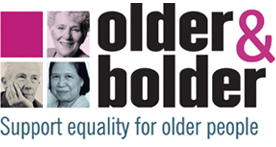Older & Bolder closed June 2013 This is an archived website
Concern for the welfare of older people
Deep concern for the welfare of older people – Older & Bolder respond to Minister Reilly
Responding to Minister of Health James Reilly's comments earlier today, Patricia Conboy Director of Older & Bolder said, “I am deeply concerned for the well-being of older people living in care homes. They hear Minister O’Reilly saying that public nursing homes are going to close but they don’t know where the axe is going to fall. What is the plan? It isn’t good enough to say that we need to save money and that some homes don’t meet HIQA standards. We need a planned approach to the distribution of nursing home beds, on the level of public/voluntary beds we need in the system. The publication of the Prospectus report on nursing home beds, completed in 2007, should be published now. That would be a good first step.”
Ms Conboy continued, “Minister Reilly said one thing that we in Older & Bolder wholeheartedly agree with ‘Reform is the key (in the health system) and we need to change the way we deliver services’. What we, and the members of our alliance want to know is, what is going to happen to home and community care services – which are discretionary – when cuts of €853 million are imposed in 2012 ? Unless people have reliable access to home help, day care, respite, any plans for reform are doomed to failure. We have yet to see how community care supports (e.g. Home Help, respite, Home Care Packages) will be affected by this Budget. ”
Older people who need and receive community care value this support enormously but we know that access is currently discretionary, unequal and problematic. Recent TILDA research shows that while only a small proportion of older people receive home help services, there are many who should, but do not.
Community care supports should have a central, not peripheral, role in health service planning and delivery. It is difficult to see how Minister Howlin’s forecasting of greater efficiencies from ‘a more rigorous allocation of home help hours’ will help rather than hinder older people to age well in their own homes.
Facts:
• Only 3.5% of people over 50 receive state provided home help services.
• Of those with both ADL (activities of daily living) and IADL (instrumental activities of daily living) impairments, 12% do not receive formal or informal help and these people constitute a potentially very vulnerable group.
These facts are from The Irish Longitudinal Study on Ageing (TILDA), a large-scale, nationally representative study of people aged 50 and over in Ireland. More than 8,000 people participated in the first wave of TILDA interviews and first results were published in 2010.










